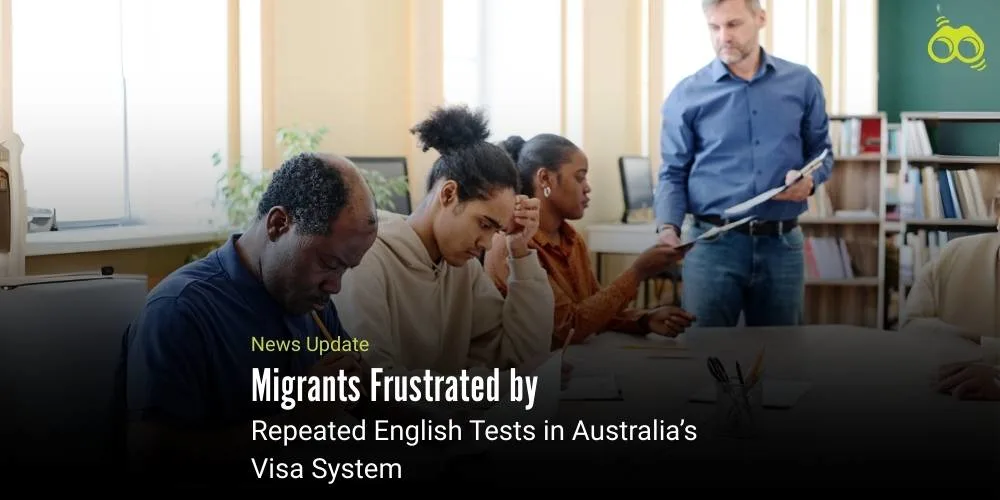Migration Policy Scrutinised Over Costly Language Exams for Long-Term Residents
Visa System Under Fire: Repeated English Tests Raise Equity Concerns in Australia
Australia’s migration system faces mounting scrutiny as fluent English-speaking migrants are repeatedly required to undertake language proficiency tests during visa procedures. Despite clear evidence of competence, many applicants report being compelled to sit multiple examinations due to the expiry of certification documents, treated in the same manner as health checks or police clearances, regardless of their long-term residency or linguistic background. One such case is that of Apsara Raj, who reportedly speaks English as her first language and has lived in Australia for over a decade. She explained that she had already spent close to $3,000 on various English tests while applying for different visas. Even after consistently achieving high scores, she was still required to prove her competence each time she progressed to a new stage of her visa application. According to her, the process is stressful, costly, and unnecessary for individuals with a proven command of the language.
Government authorities maintain that English certification remains a vital component of Australia’s visa requirements, particularly for work visas, student visas, and permanent residency applications. The Department of Home Affairs has stated that testing is essential to manage “immigration risk” and ensure that applicants can fully participate in Australian society. Different visa categories demand varying standards of proficiency, which must be demonstrated through one of the nine approved examinations, including IELTS and the PTE Academic. Each test can cost upwards of $400, placing significant financial pressure on applicants.
Experts acknowledge that these rules form part of Australia’s immigration laws, yet they often impose considerable hardship. Dr Dominic Dagbanja, Associate Professor of Law at Curtin University, submitted evidence to a Senate inquiry, arguing that the policy not only stretches migrants financially but also delays access to professional opportunities. He further noted that while the stated aim is to measure competence, the content of some tests does not always reflect practical English use. Simultaneously, the system has become a source of economic gain for private testing providers. Concerns have also emerged regarding the growing use of artificial intelligence (AI) in marketing. The PTE vs IELTS debate has intensified, with migrants claiming that AI-driven assessments sometimes fail to reflect genuine ability. Education specialists report that candidates with strong English skills occasionally receive unexpectedly low scores. Others warn that online tutorials promote “hacks” to manipulate AI scoring systems, such as using robotic speech patterns or templated answers. In response, Pearson upgraded its marking system in 2022, introduced human verification in 2024, and implemented further reforms in 2025.
Although reforms have aimed to improve fairness, applicants continue to face challenges in practice. Some cite poor testing conditions, including distractions in crowded exam rooms and faulty equipment that affect performance. Migrants such as Chintan Ray note that the high cost of tests is compounded by inadequate facilities, making the process even more frustrating. In an effort to address integrity concerns, the government has accepted additional testing providers and revised score equivalencies to ensure consistency across exams. A spokesperson for the Department of Home Affairs explained that these adjustments form part of broader immigration policy changes designed to enhance reliability. However, critics argue that exemptions are applied inconsistently. For instance, nationals of the UK, US, Canada, Ireland, and New Zealand are automatically treated as competent in English for certain visa types, while applicants from Asian countries—even those educated in English—continue to face repeated testing.
Education consultants observe that many migrants fail not due to poor English but because of last-minute preparation, shifting visa rules, and varying state-level requirements. Tutors add that frequent policy updates leave applicants with little time to prepare, especially when balancing work commitments. Nevertheless, high scores remain crucial for skilled migration, as points-based visa systems award extra marks for English proficiency. Dr Dagbanja and other commentators have called for further reform, stating that Australia’s immigration system should reflect national values of fairness and equal treatment. They argue that migrants who contribute significantly to the economy should not face repeated barriers, unnecessary expenses, and avoidable delays.
This ongoing debate highlights the broader challenges surrounding Australia’s migration system and the need to balance integrity, inclusivity, and efficiency in visa processes. The future of English testing in Australia will remain central to discussions on immigration reform, skilled migration, and equitable access to opportunity.
Editor’s Note:
Australia's migration system faces an increasing problem: the continuous requirement for English language tests. This is a concern even for long-term residents and fluent English speakers. It shows, through real experiences and expert views, how these rules create financial stress, emotional strain, and professional barriers for many applicants. The report explains how test expiry dates, inconsistent exemptions, and complex visa rules add to the burden. It also notes how testing providers benefit financially from the system while migrants struggle with repeated costs and uncertainty.
The role of artificial intelligence in marking, and the concerns about fairness in computer-based exams are also discussed. These tests are meant to protect immigration standards, but they often fail to recognise lived experience and practical language use. As debates over migration reform continue, the article calls for a more balanced approach, one that maintains integrity but also respects fairness and inclusion. It stresses the importance of designing visa processes that reflect Australia’s values and make it easier for skilled migrants to contribute fully to society.
Skoobuzz underlines that the current rules raise important questions about whether they genuinely support the long-term goal of integration or merely create avoidable delays and frustrations. It stresses that policymakers, educators, and migration advocates must work towards solutions that are both practical and humane.














0 Comments (Please Login To Continue)